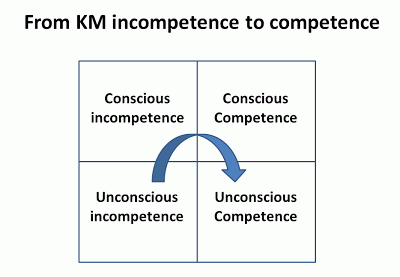Artificial Intelligence For Everyone Has Arrived! What Does That Mean For Knowledge Management?
Anyone who has been following the discussions in Internet tech forums this week gets the unmistakable feeling that we are currently experiencing a qualitative transition, from a yesterday in which artificial intelligence (AI) was either a thing of the future or worked in secret behind specialized systems (Google Auto-Complete or error-prone Tesla Autopilots), and a today in which the technology is suddenly available to all Internet users at the push of a button for a wide variety of tasks and queries. Change happens, as Hemingway put it, "first gradually, then suddenly." We are experiencing just such a sudden moment.
But why am I writing
this here in a knowledge management column? Let's first take a step back: What is
knowledge management fundamentally about? Knowledge should be collected,
managed and used within an organization. And users within this organization
should be able to access relevant knowledge and information quickly and easily.
All with the goal of facilitating the work of employees, making better
decisions, and ultimately increasing the effectiveness and efficiency of the
organization.
Up to now, organizations
have used various tools and methods for this purpose, such as databases,
document management systems, knowledge portals or corporate social networks. These
help us to store and organize information and to share it with users in various
forms.
A turning point for AI in everyday life
But what exactly does
this mean for everyday work in our organizations, today and going forward? How
could AI be used in knowledge management in concrete terms, and what are the
benefits, opportunities and risks? This whole week I’ve been testing ChatGPT
and thinking about the possible implications for our work.
What is clear is that
this is a real technological breakthrough (that
I personally have been waiting for for a while) that unleashes a whole
avalanche of ethical, political, and philosophical questions that we can't
cover all in one post here (more on that hopefully in another post later).
But if we first focus
very specifically on what the availability of such AI means for knowledge
management in organizations like ours, I would say that the following scenarios
are foreseeable (or have already occurred in some cases):
1. Support in finding relevant information and
documents
Imagine you're
looking for a specific document, but you don't know exactly where to find it.
With an AI-based chatbot fed with your organization's complete database, you
could ask your question in the chat, and the system would then automatically
track down the relevant documents and information from the company's various
systems and provide them to you. It's like having your own personal assistant
researching the information you need. Or a hundred of them.
2. Automated generation of reports and analyses
AI systems can analyze
large volumes of unstructured data and extract important information and
knowledge. From this information, AI then automatically generates reports,
analyses, or presentations that are useful for communication or decision-making
within the organization. For example, an AI system could automatically identify
trends and patterns in an NGOs donations and visualize them in a report. Or it
could analyze field reports from projects, identifying recurring problems and
challenges that arise in different contexts, and then formulate "lessons
learned" from them.
3. Automation of simple knowledge work
AI systems like
ChatGPT can also help automate certain tasks and processes within the
organization. For example, it can generate a list of ideas on a topic,
summarize meeting minutes, formulate first drafts of letters, press releases,
or talking points, compile an FAQ from a given text, or draft the outline of a
social media campaign on a topic (including Facebook posts, tweets, and
hashtags). And this isn't stuff of the future, we've already tried all of this
out this week.
4. Finding the right contacts
An AI system that can
access an organization's database could help users find the right colleagues at
the right time who can help them with certain topics and problems. Based on
user queries and profiles, the system could learn which colleagues are
particularly competent in which areas and what experience they have in relation
to certain topics. If a user then asks a question about a certain topic, the
chatbot would suggest appropriate colleagues who can help them with their
problem.
What is striking when
using ChatGPT for the first time is that the special strength of the chatbot
lies less (or not only) in the quick retrieval of facts, but in the quite
astonishing ability to independently create content. One could speak of a
Copernican Revolution of creativity: A paradigm shift by which, for the first
time, humans are no longer the only (and, in the long run, perhaps not the
primary) source of creative content. What this means for the flood of
information on the web, the value of people's professional expertise, for art
and the creative industry, or for democratic discourse in society, we cannot
yet even foresee. But the consequences will be very far-reaching.
World knowledge or organizational knowledge?
Basically, we have to
distinguish between external AI systems like ChatGPT, which have been trained
by vendors (in this case the company Open AI) with the available
world knowledge (which should not be relied upon to reproduce correctly by the
way), and internal systems, which are entrusted with the data stock of one's
own organization (where many questions regarding privacy, hosting, security,
etc. would have to be clarified).
The former case is a
reality as of this week with ChatGPT. Give the bot a task via chat and it does
it in seconds with the quality of a high school graduate, albeit (still) a bit
template-like and soulless.
The second case is not yet a general reality (or not yet in the affordable range), but I am sure that in the near future various providers will come up with commercial offers for organizations of various sizes. And even then, it won't be overnight, because training an AI with your own data takes quite some upfront work. The opportunity here, however, is that as training and internal data grows, an organization builds its own internal AI instance that exactly matches its needs, history, operations, and intent, which is invaluable in the long run. Because it will be the output of these proprietary AI memories that will give organizations a long-term competitive advantage in the marketplace of ideas. But of course, the reverse is also true: Organizations that close their minds to this development now, thinking that all of this has nothing to do with them, will have a hard time surviving in the long run. First gradually, then suddenly.




Comments